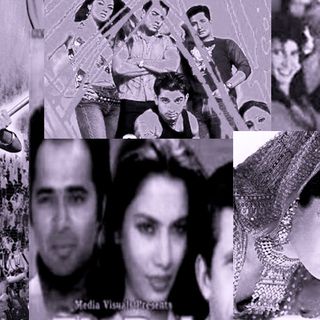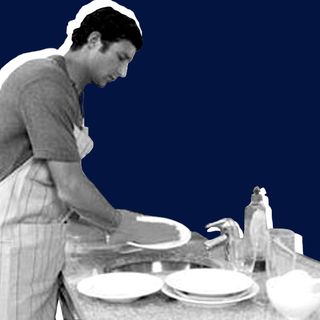
‘Manmarziyaan’ Is a Radical Movie Because It’s About a Selfish Woman
A female character who is allowed to be human is so very rare — and refreshing.

‘Manmarziyaan’ literally translates to ‘what pleases your heart.’ It’s an inherently selfish notion, but one that requires the act of selfishness to excavate — what is it that you actually want?
This is the journey that Rumi, played by the exceptional Tapsee Pannu, goes on in Anurag Kashyap’s latest foray into romance. Manmarziyaan is an enjoyable, if not predictable, millennial version of the age-old love triangle, complete with marriage agents setting up weddings alongside small-town Tinder hook-ups. But we have to be grateful for Kanika Dhillon, the screenwriter who takes this Amritsari love story away from the kheths, and gives us Rumi. Rumi is at the center of the story, the object of infatuation for both Vicky (Vicky Kaushal), the non-committal man-child, and Robbie (Abhishek Bachchan), the ‘husband material’ stock-broker from London who is about as exciting as a slice of toast. None of this matters though, because Manmarziyaan gives us a feminist character who does something amazing — she is selfish.
Rumi is allowed to be hungry, to be greedy, to be unapologetically selfish, and it is so refreshing to watch her.
Opening with Vicky jumping from roof to roof, to sneak into her bedroom, we’re very clear about the nature of their relationship. It’s about ‘fyaar,’ which is different from ‘pyaar’ in that its a feverish, intoxicated, frenzied, and physical version of love. Rumi’s unabashed sexual desire is established from the get-go, signalling her as the antidote to the ‘sanskaari’ love interests we’re so used to.
Their relationship seems to be fulfilling for the both of them, until Rumi’s family finally confronts the reality that their love story is less than ‘pure.’ They tell her she needs to get married. When Vicky suggests that he might not be ready for marriage, Rumi asks him to run away with her. His response to her is: ‘Not tonight, Mummy is making gobi paratha.’ It’s difficult not to roll your eyes at the DJ-wannabe who represents so many coddled Indian men who can’t handle responsibility, rebellious haircut or not.
In allowing her this recklessness, she is allowed to be human — and that is so very rare for women.
Since Vicky isn’t able to commit, Rumi tells her family, “I will marry any ullu ka pathha you choose.” And that is what happens. Polite and patient, Robbie knows that Rumi is probably still in love with her ex-boyfriend, but he marries her anyway. However, he also repeatedly tells her that the choice of who she ends up with, lies only with her. Of course, Robbie gets upset when the journey Rumi takes to figuring out what she wants includes an extramarital affair with Vicky. But she needed that space, to be messy and loud, to cry and scream and fuck, to find out who she really was and what she really wanted from these two men. In allowing her this recklessness, she is allowed to be human — and that is so very rare for women.
Amit Trivedi’s music and the cinematography by Sylvester Fonseca give the film a frenzied rhythm that matches the pace of Rumi’s walk, the wild beating of her heart. She is almost always moving, with shots of her going for runs, driving through the crowded streets of Amritsar on her bike, or determinedly walking — taking up space in public places, just as she takes up space in intimate settings, like the hotel room on her honeymoon, and at her in-laws house.
Wherever she is, she makes no excuses for her appetite, from her own sexual desire to the spice level of her pani puri. “Jalaana hai mujhe,” she says to the chaat vendor, “Dragon hoon main.” (I want to burn it all down. I’m a dragon.) At one point, Rumi literally beats Vicky with her hockey stick — not even her anger can be contained.
In her selfishness, Pannu’s character might not be likable. Some reviewers agree on this, going so far as to hope “someone would slap this unapologetic self-server hard.” She causes a lot of pain, and doesn’t seem too worried about the consequences of her actions or how they would affect her family. She’s fine with her decisions as long as they gratify her. And it’s because of this, that she’s able to grow as a person. But most people aren’t used to strong women who take what they want. The ‘selfish’ woman, as it were, is too unfathomable.
Women are tasked with taking care of other people, and the idea of putting oneself first is almost always an accusation. For Rumi to base her decisions on her own happiness, prioritizing herself over her family or what society expects, seems completely radical (and enraging to men who feel threatened by this).
In the end, Manmarziyaan‘s love triangle isn’t really about who Rumi ends up with, but the messy way she gets there.
Nadia Nooreyezdan is The Swaddle's culture editor. Since graduating from Columbia Journalism School, she spends her time thinking about aliens, cyborgs, and social justice sci-fi. She's also working on a memoir about her family's journey from Iran to India.
Related


We’ve All Been Sold a False Story on Fatness
